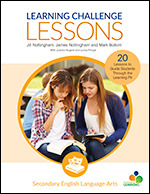Learning Challenge Lessons, Secondary English Language Arts
20 Lessons to Guide Students Through the Learning Pit
with Mark Bollom, Joanne Nugent, and Lorna Pringle
Corwin Teaching Essentials
Brain-Friendly Teaching & Learning | Critical Thinking Skills | Teaching Methods & Learning Styles
Practical strategies for bringing The Learning Challenge to life in your secondary ELA classroom
The Learning Challenge has captured the imaginations of educators, students, and their parents by introducing the idea of Learning Pit”—a state of cognitive conflict that causes students to think more deeply, critically, and strategically until they discover their “eureka!” moment.
Now, fans of the The Learning Challenge who want practical examples and ready-to-use lessons for their secondary ELA classrooms need not look any further. This book provides teachers with everything they need to run thoughtful, dialogue-driven challenges so that students engage more deeply with the classics and develop literary skills critical to ELA standards. Students will analyze texts in lessons grounded in cognitive conflicts such as
- We are all responsible for our own actions, and yet we sometimes act because we are following orders or instructions from others (Lesson 1: Who was responsible for the death of William in Mary Shelley’s Frankenstein?)
- To be successful you cannot fail, but most successful people have experienced many failures along the way (Lesson 7: Was Jay Gatsby a success?)
- Love is impossible to define, and yet everyone knows what love is (Lesson 11: Is Romeo really in love?)
From detailed lesson plans and activities for running Learning Challenges in the classroom, to full-color activity cards that enhance each lesson, this must-have resource offers relevant and timely instructional strategies on topics that interest and engage secondary students.
Free resources
Lesson: Who Was Responsible for the Death of William in Frankenstein?
This lesson from Learning Challenge Lessons, Secondary English Language Arts will enhance your students’ knowledge and understanding of Frankenstein by Mary Shelley, with focuses on characterisation, responsibility and developments in science.
The potential of this book is paramount; a valuable resource for any secondary language arts classroom.
Learning Challenges for ELA Students by Jill Nottingham and James Nottingham provides a fresh, engaging approach to traditional texts, from poetry to classics like Romeo and Juliet and Of Mice and Men. The constructive approach fosters students’ ability to form and support opinions and inferences, supported by text.
The lessons included in this text are strong examples that I would recommend to any teacher seeking to guide students through the ‘Learning Pit’ and engages students in critical thinking based upon textual analysis.
The authors have provided a pragmatic teacher resource bridging the concepts of Challenging Learning to instructional implementation in context! For some, it will take the guesswork out of creating a lesson that puts students “in the learning pit.” For others, this text will be influential in sparking their creativity for systematic lesson design.
Yet another superb Nottingham Learning Pit publication. Detailed, yet accessible, practical yet thought-provoking, this book lays out comprehensive lesson ideas, built around searching questions, which take students through cognitive conflict to deep understanding of secondary English contexts.
This is an excellent resource for any teacher seeking to develop the quality of dialogue in their classroom. It’s a very practical resource, which neatly bridges the gap between theory and practical application. Imaginative use of these ideas will enable teachers to offer challenging and engaging learning experiences for students and develop their capacity for creativity and critical thinking. I would whole-heartedly recommend this excellent, highly readable addition to the ‘Challenging Learning’ library.
The Nottinghams have written a must-read, practical implementation guide for any ELA teacher considering integrating Challenging Learning into their classroom. This book provides ELA teachers with countless strategies and a systematic approach to lesson planning that will move students to deeper understanding of conceptual ideas through dialogue and exploratory talk. This text is the perfect ‘how to’ companion to Nottingham’s previous publications. Read this book and walk away with the confidence to effectively and efficiently plan to move students in and out of ‘the Learning Pit’ on a regular basis.
The work of James and Jill Nottingham, along with all of their colleagues at Challenging Learning,
has finally provided the ‘what next’ in education to support deep and engaging learning for all students.
Within their series of Challenging Learning books, including Learning Challenge Lessons
for ELA Students, educators are able to take the key ideas within Challenging Learning and the
Learning Pit, and put them into practice in a practical way. Every secondary ELA teacher needs to
get this resource in their hands!
The Learning Challenge Lessons book is brilliant for improved learning on several levels. First of all, it provides you with an insight on how to design for deeper learning for students, by role-modelling lots of examples of how to use and ‘travel through’ The Learning Pit. Second, it helps you as an adult to develop a common language for and a better understand of learning in general. And last, but not least, it challenges your students’ thinking (and perhaps yours as well), and therefore their overall learning skills.
- This book is a must for secondary teachers searching for strategies to guide adolescents through creating and replicating the thrill experienced from learning. If you are hungry to activate your students to embark on a challenging journey – from being in a state of cognitive dissonance until progressing to the point of ‘EUREKA! I’VE GOT IT!’ – then the Nottinghams have answers sure to satisfy your craving!
